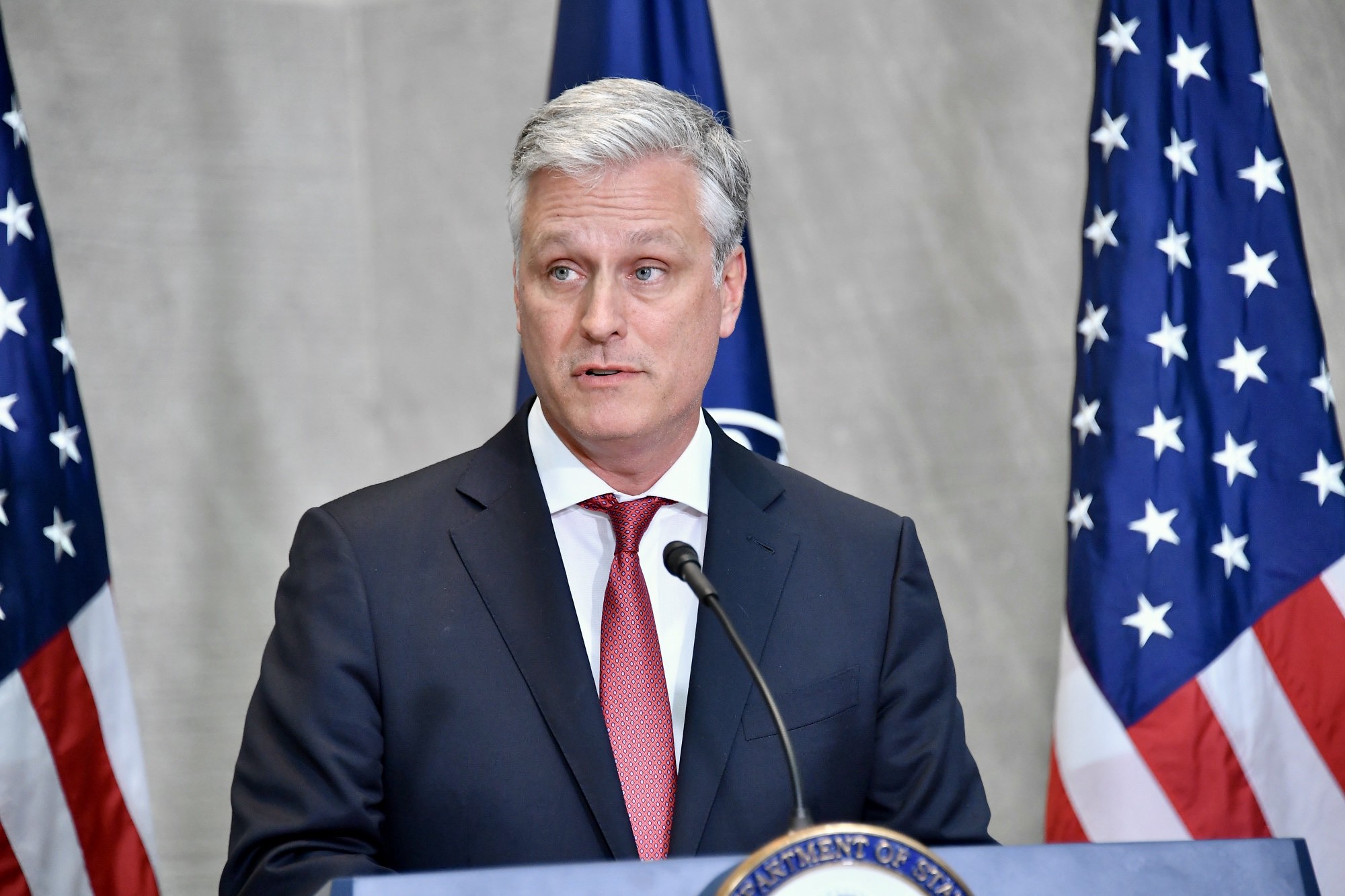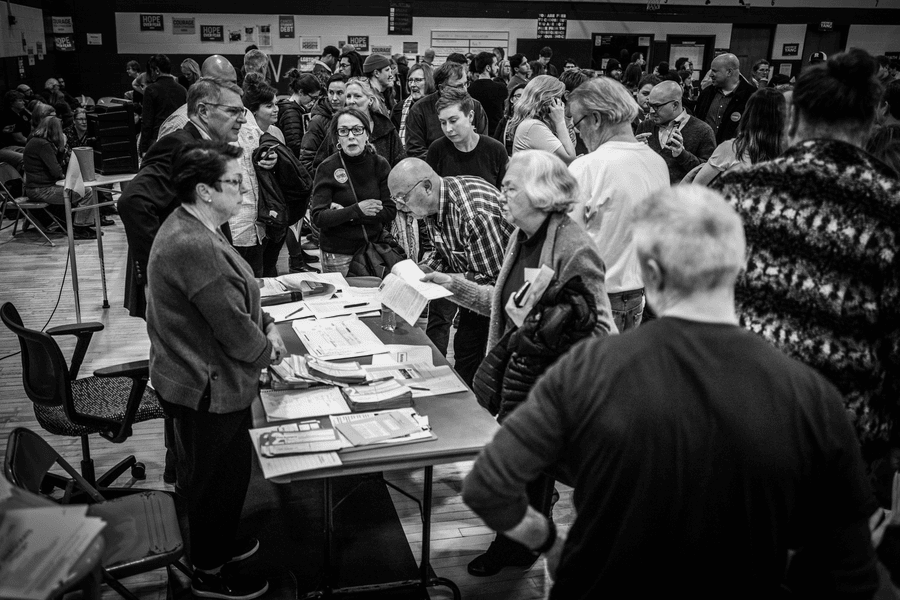Does the DHS Whistleblower Report Reveal an Election Interference Scandal?
The whistleblower claims the national security adviser personally gave explicit instructions to the Department of Homeland Security to prioritize intelligence about Chinese interference.

Published by The Lawfare Institute
in Cooperation With

Last week, the former head of intelligence and analysis at the Department of Homeland Security, Brian Murphy filed a whistleblower complaint alleging a wide range of misconduct by department officials, including misleading Congress and politicizing threat intelligence. Among the many serious claims, Murphy’s complaint includes a consequential revelation about the Trump administration’s attempts to distort and politicize foreign election threats.
Headline coverage of the complaint has focused on Murphy’s claim that senior administration officials pressured him and others to downplay or ignore Russian attempts to influence the U.S. election—another episode in the Trump administration’s long pattern of denying the scope and gravity of threats from Russia. Those allegations describe misconduct that must be taken seriously. But Murphy doesn’t just allege he was pressured to downplay threats from Russia—he also says he was directed to prioritize intelligence reporting and analysis about China and Iran. If confirmed, this would be a serious abuse of power.
The complaint documents a series of protected, classified disclosures that Murphy says he made between March 2018 and August 2020, about “abuse of authority, attempted censorship of intelligence analysis and improper administration of an intelligence program related to Russian efforts to influence and undermine United States interests.” Murphy offers a startling detail: In mid-May 2020, acting Secretary of Homeland Security Chad Wolf directed him “to cease providing intelligence assessments on the threat of Russian interference in the United States, and instead start reporting on interference activities by China and Iran. Mr. Wolf stated that these instructions specifically originated from White House National Security Adviser Robert O’Brien.”
In other words, Murphy claims that in May 2020, the national security adviser personally gave explicit instructions to the Department of Homeland Security to prioritize intelligence about Chinese interference over reporting on Russian meddling in the election.
This seemingly small detail is a big deal. Since July, the Trump administration has been pushing a deeply misleading narrative that China is engaged in election interference activity, that China poses a greater election interference threat than Russia, and that China is motivated by a desire to assist Joe Biden’s campaign. In fact, this narrative is emerging as a central theme of the president’s reelection campaign. It’s disturbing enough for a president and his allies to distort intelligence assessments for political gain, but Murphy’s account suggests something more nefarious—that intelligence authorities and positions of public trust might have been used to engineer the narrative from the outset.
Before we get ahead of ourselves, we should offer a note of caution. Murphy is not a disinterested party. He was recently removed from his position following reports that his division of Homeland Security had distributed intelligence reporting related to the public activity of journalists—including Lawfare’s Benjamin Wittes—and there are reasons to be skeptical of Murphy’s self-interested account of events. That said, a number of his allegations are facially credible and supported by the public record. His account regarding O’Brien is one such claim—and, importantly, Murphy also references separate meetings of the National Security Council Deputies Committee where relevant discussions occurred and names other parties as witnesses to the events.
The Trump administration’s efforts to push a false narrative about China and Biden are well documented at this point. A Sept. 1 Politico article noted that “a new talking point has taken hold among Donald Trump and his allies: that U.S. intelligence shows that China would prefer a Joe Biden presidency and is trying to help him win.” This claim is not supported by the intelligence assessments in question, and national security officials familiar with the underlying intelligence have confirmed in multiple press articles that the representation is inaccurate. Both CNN and Yahoo have recently reported on the phenomenon as well. Just last week, Trump tweeted an article from Breitbart claiming China was “favoring Biden” in the presidential election and that Beijing was fueling Black Lives Matter protests, among other dubious assertions. Prominent right-wing media voices, including Trump lawyer Rudy Giuliani, have likewise amplified the claims on social media while pushing the hashtag #BeijingBiden.
Prior to Murphy’s whistleblower complaint, it appeared that this false narrative originated in a misleading intelligence assessment released on Aug. 7 by William Evanina, director of the National Counterintelligence and Security Center (NCSC). That statement said that the Office of the Director of National Intelligence is “primarily concerned about potential activity by China, Russia, and Iran.” Evanina went on to clearly state that actors linked to the Russian government had made attempts to undermine Biden’s electoral prospects, writing “Russia is using a range of measures to primarily denigrate former Vice President Biden” and pointing to specific examples of Russian maneuvering.
On China, however, the assessment is vague and equivocal: “We assess that China prefers that President Trump ... does not win reelection,” Evanina wrote. But the statement neither asserts nor offers evidence that Beijing is actually working to prop up Biden or taking any affirmative steps to interfere in the election at all. Instead, it describes general opposition from the Chinese government to specific U.S. policies and ongoing influence efforts to manipulate the political landscape toward its interests. In other words, a statement about election security included a section describing a traditional counterintelligence threat—a campaign of propaganda and lobbying, some of which is overt and legal, and some of which is not.
The counterintelligence threat from China is very troubling, but it isn’t election interference. While the Chinese counterintelligence threat presents a significant long-term threat to U.S. interests, Russian electoral interference threatens the immediate legitimacy of our core democratic process. As former Deputy Director of the National Security Agency Rick Ledgett recently put it, “Russia is a forest fire and China is global warming.” To borrow Ledgett’s analogy, the NCSC statement is like beginning a report on a string of arsons with a lengthy discussion of greenhouse gases.
So why did Evanina include China in his assessment? A number of U.S. officials told the Washington Post at the time that the inclusion was intended to create a false equivalence between Russian activity and China: “‘Between China and Russia, only one of those two is trying to actively influence the outcome of the 2020 election, full stop,’ said a senior U.S. official.”
Congressional Democrats had already called out Evanina for grouping Russia, China and Iran together in an earlier, less-detailed statement on election interference from July, saying, “The [July] statement gives a false sense of equivalence to the actions of foreign adversaries by listing three countries of unequal intent, motivation and capability together.” While they praised the Aug. 7 release for including more detail, they wrote, “Unfortunately, [the August] statement still treats three actors of differing intent and capability as equal threats to our democratic elections.” Notably, Pelosi et al. didn’t accuse Evanina of skewing intelligence for political purposes. Even officials critical of the substantively misleading statement were quick to extend Evanina the benefit of the doubt. The Post quotes former CIA officer Marc Polymeropoulos saying it was crafted to satisfy both campaigns, a practice known at the agency as “dancing through the raindrops,” and includes a similar suggestion from an anonymous former official: “The former senior official suggested Evanina worded the statement so as to not incur the wrath of the White House while ‘sticking to analytical language.’” Evanina’s quandary, the official said, is “how do you get the truth out there in a way that doesn’t get you fired.”
It’s a charitable assumption, to be sure, but plausible enough. By this line of thinking, Evanina is an intelligence official caught in an impossible position who, while keeping the statement technically accurate, inserts a little political spin to avoid partisan gridlock.
But politicizing intelligence assessments is always dangerous, even if done with good intentions. And now Murphy’s whistleblower complaint suggests that there might be something far more nefarious at work.
Murphy alleges that months before Evanina’s misleading statement, O’Brien had started to direct Homeland Security officials to engage in precisely this type of politicization. If Murphy is to be believed, O’Brien was directing the department to go out in search of intelligence in order to support the political narrative that China, not Russia, is the bigger threat. It isn’t a leap to wonder now whether Evanina’s statement was a capitulation to similar pressure from O’Brien or others.
To appreciate the significance of the statement—and the need to get clarity on the circumstances surrounding its drafting and the underlying intelligence collection and analysis—it is important to recognize how aggressively the president, administration officials and campaign surrogates have been pushing this talking point since mid-August.
On Aug. 17, Director of National Intelligence John Ratcliffe told Fox News in a statement that “China poses a greater national security threat to the U.S. than any other nation–economically, militarily and technologically. That includes threats of election influence and interference.” Ratcliffe shared the Fox News article on Twitter. On Aug. 21, in an interview with Fox News, the president said, “China owns Joe Biden …. They own Joe Biden, they own him, and they want me to lose so bad.”
The narrative emerged as a major talking point at the Republican National Convention. In his Aug. 25 remarks at the convention, Donald Trump Jr. said, “Beijing Biden is so weak on China that the intelligence community recently assessed that the Chinese Communist Party favors Biden.” Former U.N. Ambassador Nikki Haley echoed the theme in her own remarks that evening, saying, “Joe Biden is good for Iran and ISIS, great for Communist China[.]” That same day, Sen. Tom Cotton dedicated an entire Fox News op-ed to elaborate on the theory, writing
[T]he Chinese haven’t done much to hide their preference – in trade negotiations with the Trump administration, they suddenly took a much harder line when Biden announced his candidacy last year, figuring that they might soon have a friend in the White House.
When, for a time, it looked like Biden wouldn’t get the Democratic nomination, the Chinese were suddenly more willing to strike a deal, which they closed in January when Biden was near his weakest point in the polls …. Episodes like these are why our intelligence community has concluded that China prefers Joe Biden’s candidacy to the reelection of President Trump.
The next day, Trump tweeted, “Just In: Chinese State Media and Leaders of CHINA want Biden to win ‘the U.S. Election’[,]” and Deputy Attorney General Jeffrey Rosen gave prepared remarks at the Center for Strategic & International Studies that hewed more closely to the actual assessment, while amplifying Evanina’s framing.
The administration’s efforts have only accelerated since then. In an Aug. 30 interview, Maria Bartiromo asked Ratcliffe “about China and what they’re trying to do in this election?” He responded, “I can’t get into a whole lot of details, other than to say that China is using a massive and sophisticated influence campaign that dwarfs anything that any other country is doing.” He added, “but when we talk about influence and malign foreign influence, what China’s doing that no one else is doing is, they’re engaging at the local, state and federal level[.]” Ratcliffe then parroted the same talking point about China’s supposed preference for Biden, saying that Beijing is “playing in the election or expressing preferences for Vice President Biden over President Trump because ... President Trump has been tough on China.”
A few days later, on Sept. 2, Attorney General William Barr went on CNN and also used the NCSC statement as the basis for an untrue assertion. When asked by Wolf Blitzer what country named in the NCSC statement was most aggressive in U.S. election interference, Barr confidently proclaimed, “I believe it’s China.” He claimed his conclusion was based on having seen the intelligence but refused to elaborate further. Barr doesn’t mention that in this comment to Blitzer he is offering an assessment that is contrary to the NCSC statement being discussed, and he uses the same conflation of election security and counterintelligence threats in defending his position. House Intelligence Chairman Adam Schiff said in a later interview on CNN that Barr “is just flat-out lying to the American people, and it’s tragic but it’s as simple as that” and emphasized that Evanina’s statement mentioned that “Russia was actively interfering,” whereas China merely had a preference.
Notably, O’Brien himself is actively pushing the falsehood as well. In a Sept. 4 White House press conference, O’Brien repeatedly dodged and misled when pressed on the respective nature and scope of the Russia and China election threats. In response to a question about Trump’s falsehoods on mail-in ballots mirroring Russian propaganda, O’Brien replied:
When it comes to elections and what the intelligence community has made very clear is that, first, you have China, which has the most massive program to influence the United States politically; you have Iran, and you have Russia. These are all three adversary countries that are seeking to disrupt our elections. Some of them prefer Biden. Some people say some of them prefer the President.
O’Brien said he agreed “100 percent” with Barr’s statement that China is being more aggressive than Russia in meddling in the election. And he doubled-down when asked about foreign actors spreading campaign disinformation, saying, “[W]e know that the Chinese have taken the most active role, but the Russians and the Iranians and other countries are involved as well.”
Pressed for details on “what specifically you’re seeing from China that makes you believe that they have a bigger or harder-working electoral interference operation than Russia or other countries[,]” O’Brien launched into a long, nonresponsive soliloquy about American foreign policy toward China over the past four decades. When a journalist interrupted to press him—“But specifically on the election,”—O’Brien commented, “when it comes to the election, everything that they’re doing across the board, whether it’s political influence through the Confucius Institutes; whether it’s them trying to influence business leaders … [or] the massive activities of the Chinese in the cyber realm, it’s really an extraordinary thing that we’re facing.”
Four days later, Murphy filed his whistleblower complaint. His allegation about O’Brien raises urgent questions, particularly in light of the existing public record. We don’t know the answers, but Congress and the press should be asking. Here are a few to start:
- Did O’Brien or any other Trump official direct the Department of Homeland Security to stop or reduce intelligence assessments related to Russian election interference and to prioritize reporting on China and Iran?
- If so, did O’Brien or others give this direction in order to benefit the president’s political interests and harm the president’s political opponent?
- Has O’Brien or the White House directed any other elements of the intelligence community or government to similarly prioritize the threat from China and minimize the threat from Russia?
- Did pressure from O’Brien or others play any role in the creation of a misleading intelligence assessment released by the NCSC that appeared designed to inflate and distort the scope, nature, and motivation of election threats from China, while minimizing the scope, nature, and motivation of election threats from Russia?




.jpg?sfvrsn=d8787e74_5)

